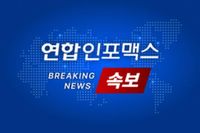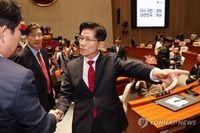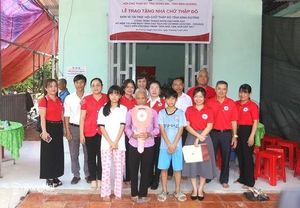In a dramatic display of political tension, Kim Moon-soo, the presidential candidate for the People’s Power party, publicly confronted party leadership during a general meeting of lawmakers on May 9, 2025. The meeting, which took place in Yeouido, Seoul, saw Kim vehemently oppose what he described as a "forced unification" aimed at sidelining him in favor of an unpopular candidate. His remarks sparked immediate reactions from party officials, particularly Kwon Young-se, the party’s emergency committee chairman, who expressed disappointment at Kim's stance.
Kim arrived an hour later than expected to deliver his first speech since being confirmed as the party's candidate. He made it clear that he would not accept any attempts to impose a candidate on the party, stating, "I cannot accept forced unification to make an unpopular candidate our party's candidate. I will lead this unification." His assertive tone underscored his determination to rally support within the party, emphasizing, "I will win even if I go out alone. I will be with the lawmakers of the People's Power."
Criticism of the party's leadership was a central theme of Kim's address. He accused the leadership of trying to push him out since his election, claiming they are mobilizing illegal methods to register an independent candidate as the party's nominee. "This is an illegal act that violates party rules and regulations, and an anti-democratic attempt to destroy the essence of democracy," he asserted. Kim's comments reflect a growing frustration within the party as he seeks to consolidate support ahead of the upcoming elections.
In response to Kim's remarks, Kwon Young-se welcomed his participation in the meeting but quickly pointed out that Kim's statements were not in line with the expectations of the lawmakers present. Kwon stated, "I think it was completely disconnected from what our lawmakers expected." He further emphasized the need for leadership qualities, saying, "If you want to be a bigger leader, you need to know how to throw yourself away," a comment that was interpreted as a critique of Kim's current approach.
The clash escalated as Kim continued to voice his concerns about the party's direction. He lamented that if he had focused on election preparations immediately after being elected party leader, the party's approval ratings would be significantly higher today. "I will gather the party's strength and win even if I go out alone," he declared, rallying his supporters to believe in his leadership.
As tensions mounted, Kwon expressed his disappointment again, stating, "I am greatly disappointed with Kim Moon-soo's remarks regarding unification." His comments highlighted the rift developing within the party, as Kwon's leadership is now being challenged by Kim's assertive stance. Kwon's refusal to consider Kim's candidacy further illustrated the party's internal conflicts.
Kim's departure from the meeting was met with mixed reactions from fellow lawmakers, who shouted criticisms such as "Listen to what we have to say" and "Don't just talk unilaterally." This public confrontation has raised questions about the future of the People’s Power party as it navigates a complex political landscape.
With the general election approaching, the stakes are high for both Kim and Kwon. Kim's refusal to engage in what he perceives as an undemocratic process could resonate with voters who value transparency and integrity in political dealings. Conversely, Kwon's insistence on party unity and adherence to party rules may appeal to traditionalists within the party who fear fragmentation.
As the situation evolves, observers are keenly watching how these dynamics will play out in the coming months. The internal struggle within the People’s Power party not only reflects the challenges of leadership but also underscores the broader issues facing South Korean politics, where the balance between party loyalty and individual ambition is constantly tested.
In the wake of this confrontation, the future leadership of the People’s Power party remains uncertain. Kim Moon-soo’s bold declarations and Kwon Young-se’s stern responses signal a critical juncture for the party as it prepares for a crucial electoral battle. The question now is whether Kim can unite his supporters and overcome the obstacles posed by the party leadership, or if Kwon’s vision for the party will prevail.
This political drama highlights the complexities of South Korean politics, where alliances are often fragile and the stakes are incredibly high. As the general election approaches, both Kim and Kwon will need to navigate these turbulent waters carefully, balancing their ambitions with the expectations of their party and the electorate.


![[속보] 권영세](https://thumbor.evrimagaci.org/KwV7aFf-9iCASuJrOe-tQDY8qIg=/200x0/tpg%2Fsources%2F9ae5ef10-27d4-4c9d-b1ef-af62643b7d08.jpeg)



